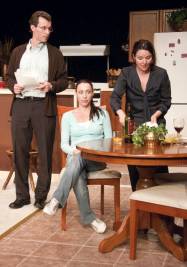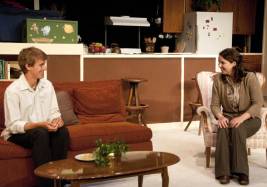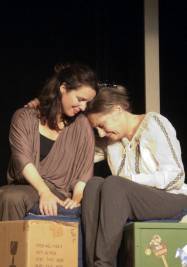RECOMMENDED
For a play that won the 2007 Pulitzer Prize for Drama, David Lindsay-Abaire’s Rabbit Hole has had surprisingly few local productions in the ensuing years, perhaps a result of its seemingly grim subject matter. For that reason alone, the play’s arrival at Theatre Palisades is good news for L.A. theatergoers. Though this high-end community theater production doesn’t reach the heights of the Chance Theater’s award-winning 2008 production, it is one worth checking out, whether you’ve seen last year’s Oscar-nominated film adaptation, a previous live staging, or this is your first exposure to Rabbit Hole.
Spoilers abound in this review, so if you wish to be thoroughly surprised, read no further (though my guess is that most informed play-or-moviegoers have at the very least heard about its basic premise).
Rabbit Hole is about grief, and the different ways that people deal with it. More specifically, it’s about what is arguably the most wrenching grief any human being can face, the loss of a child.
What makes Lindsay-Abaire’s play a Pulitzer Prize winner and not a Lifetime Movie For Women is its highly unsentimental, un-clichéd, unpredictable script, and the humor which Lindsay-Abaire finds even in the heart of tragedy.
The play’s opening scene is deceptively benign. Becca (Lara Doucette), a 30ish wife and mother, is folding the laundry, clothes which appear to be those of a four-year-old, and chatting with her spirited sister Izzy (Lauren Dykes). Baby Sis has gotten herself into a barroom brawl, and in its telling, she lets slip that she’s pregnant. Little by little, it dawns on us that the clothes Becca is folding belong to a child who is no more, a little boy named Danny who not so long ago chased the family dog out into the street and was struck by a car and killed. What makes Danny’s death even more senseless is that the car was not speeding; its teenage driver could have done nothing to avoid hitting the boy, who must simply have materialized between parked cars. It just happened, in an instant, and no one’s life will ever be the same.
Becca’s husband Howie (Samuel Huntington) deals with his grief by attending group therapy sessions and by watching endless videos of his son’s brief life. Becca copes, or attempts to cope, by making sure that nothing in her home reminds her of Danny. She has removed all pictures of him from the living room, is donating his clothes to charity, and has placed his beloved dog in the care of her mother Nat (Catherine Lydon). Becca’s husband clings to the familiar; Becca just wants to sell the house and move away.
It’s not merely Izzy’s pregnancy that prevents Becca from moving on. She has received a letter from the teenage driver Jason (Michael Conoscenti), who has written a short story which he wants to dedicate to Danny, and has asked if it would be possible to meet Becca and Howie.
No way, says Howie. Becca is not so sure, and goes so far as to read Jason’s story, a tale of alternate universes which sets Becca’s mind to wondering, is there an alternate Becca whose life is happy, and could she possibly go down the rabbit hole and become that alternate version of herself?
Those whose only exposure to Rabbit Hole has been John Cameron Mitchell’s superb film adaptation, for which Lindsay-Abaire himself wrote the remarkable screenplay, will be particularly fascinated to discover how the film’s multi-location, bigger cast-of-characters storyline developed from a single-set, five-character play, with both play and film telling the story equally well, albeit quite differently.
Anyone who saw Nicole Kidman’s breathtaking Oscar-nominated performance as Becca knows just how great a role Lindsay-Abaire has written for a leading lady. This is a woman who, to all outward appearances, seems to be holding it all together remarkably well given such a traumatic loss. Look into Kidman’s eyes, however, and you will see a grieving mother nearly on the verge of madness. Under director Tony Torrisi’s capable hands, Doucette does lovely, nuanced work as Becca, and is thoroughly believable in her grief and sorrow. What could be added, and what would elevate the performance to the brilliance of Kidman’s would be a sense that at any moment Becca could snap, perhaps irretrievably.
Huntington is very good as Howie, particularly in later scenes where his tears come from a deeply felt loss. Still, a less understated response in the “video scene” and greater rage at Jason’s surprise visit would make for even stronger work.
Dykes is particularly well cast as Izzy, and sinks her teeth into the role of black sheep younger sister to fine and funny effect. Though Lydon’s Nat is a tad too kooky for the part as written, and despite a tendency to over gesticulate, the actress makes the part work, and the scene in which Nat compares grief to a stone in her pocket is a moving one. Finally, recent USC drama grad Conoscenti plays Jason with a heartbreaking purity. His scene opposite Doucette is the production’s most powerful, beautifully played by both actors, though an earlier letter reading sequence would be more effective if Conoscenti were relieved of having to read his lines from the letter itself.
Sherman Wayne’s simple but effective set and lighting designs give us Becca and Howie’s neat-and-clean living room and kitchen, with Danny’s upstairs bedroom a constant reminder of just who and what are missing in the house and in their lives. Costume designer June Lissandrello’s choices are well made as are Susan Stangl’s sound design choices. Valerie Ruel is stage manager. Rabbit Hole is produced by Martha Hunter and Wayne.
Theatre Palisades is to be commended for taking on a play with the kind of adult themes many community (i.e. family oriented) theaters might shy away from, and thanks to L.A.’s vast talent pool, they’ve been able to find a quintet of actors largely up to bringing David Lindsay-Abaire’s beautifully simple yet profound words to life. Though not a perfect production, this is one hole well worth falling into.
Theatre Palisades, 941 Temescal Canyon Road, Pacific Palisades.
www.theatrepalisades.org
–Steven Stanley
August 28, 2011






 Since 2007, Steven Stanley's StageSceneLA.com has spotlighted the best in Southern California theater via reviews, interviews, and its annual StageSceneLA Scenies.
Since 2007, Steven Stanley's StageSceneLA.com has spotlighted the best in Southern California theater via reviews, interviews, and its annual StageSceneLA Scenies.







 COPYRIGHT 2024 STEVEN STANLEY :: DESIGN BY
COPYRIGHT 2024 STEVEN STANLEY :: DESIGN BY